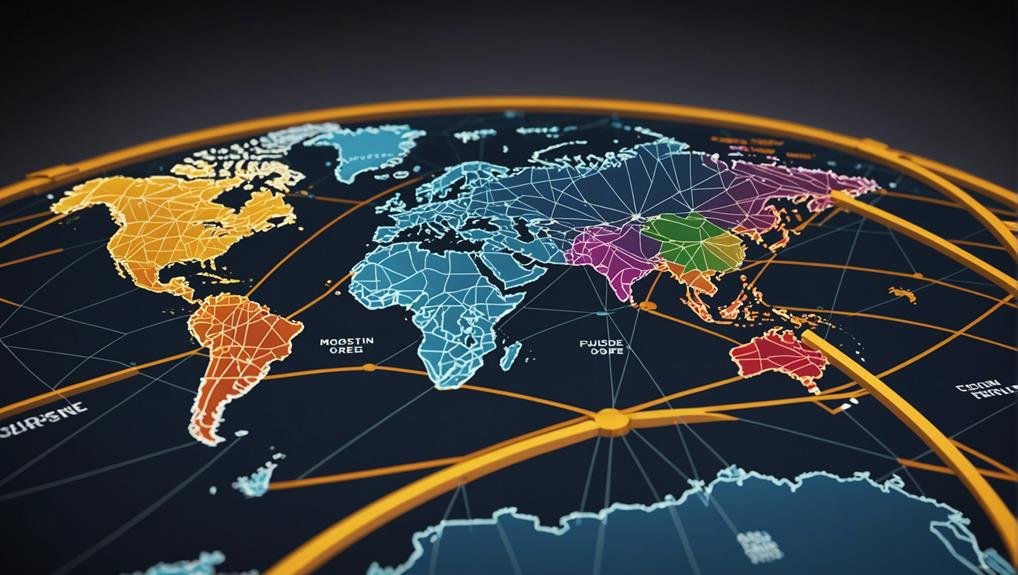Global Fdi: Insights Into Investments and Impact
Global FDI, totaling $1.28 trillion in 2022, plays a pivotal role in fostering economic resilience and growth worldwide. Different types of FDI, such as horizontal and vertical investments, bring capital, technology, and industry diversification. While advantageous for job creation and market expansion, FDI also poses regulatory and political challenges. Emerging markets are becoming primary FDI destinations, with the technology sector witnessing substantial investment influx. Policymakers and investors must navigate through regulatory complexities to harness FDI flows effectively. The intricate web of cross-border investments offers valuable insights into the evolving global economy and its impact on development and growth.
Key Takeaways
- Global FDI trends show a shift towards emerging markets as key investment destinations.
- Technology sector experiences significant FDI inflows, driving innovation and growth.
- Traditional economic powerhouses like the U.S. and China attract substantial FDI investments.
- Emerging economies are focal points for multinational corporations seeking growth opportunities.
- Policymakers and investors must capitalize on evolving FDI flows for sustainable economic development.
FDI Overview and Importance
With an intricate web of cross-border investments shaping global economies, understanding the overview and significance of Foreign Direct Investment (FDI) is paramount for evaluating economic interdependencies and strategic growth opportunities. Investment strategies within FDI encompass acquiring ownership stakes in foreign entities to establish economic ties and drive growth.
FDI plays a vital role in fostering economic growth by facilitating capital flows, technology transfer, and job creation in both recipient and investing countries. Nations with higher FDI inflows relative to GDP often exhibit greater economic resilience and development potential.
The year 2022 saw global FDI amounting to $1.28 trillion, highlighting its substantial impact on international economies. Analyzing FDI trends and patterns provides valuable insights into global economic dynamics and investment climates.
Types and Examples of FDI
The landscape of Foreign Direct Investment (FDI) diversifies through various types and examples, shedding light on the nuanced approaches and strategic engagements in global economic interactions.
Types of FDI encompass horizontal investments, where the same business is established in a foreign country, vertical investments involving complementary business acquisitions, and conglomerate investments in unrelated sectors. FDI can materialize through subsidiary establishments, acquiring controlling interests, or mergers/joint ventures.
Examples of FDI include cross-sector partnerships in industries like retail, services, logistics, and manufacturing. Remarkable instances involve emerging markets like China and India attracting substantial inflows, particularly in high-tech manufacturing and services. Industry diversification is a key aspect of FDI, illustrating the adaptability and strategic nature of foreign investments in global economic landscapes.
Advantages and Disadvantages of FDI
An exploration of the advantages and disadvantages of Foreign Direct Investment (FDI) reveals critical insights into its impacts on global economies and the strategic considerations involved in international business engagements.
FDI plays a significant role in economic growth through job creation and infrastructure development, especially in developing nations. However, FDI involvement can bring about regulatory challenges and increased political risks due to oversight by multiple governments.
To investigate further into the advantages and disadvantages of FDI:
- FDI contributes to job creation and economic growth in recipient countries.
- FDI enables multinational companies to expand into new international markets.
- FDI involves regulatory complexities and political risks that require careful consideration for successful implementation and operation.
Global FDI Trends and Statistics
Exploring the latest statistical data reveals compelling insights into the current trends shaping the landscape of global Foreign Direct Investment (FDI). FDI growth projections indicate a shift towards emerging markets as key destinations for investment.
Importantly, the technology sector is experiencing significant FDI trends, with companies seeking opportunities in innovation hubs worldwide to drive growth and competitiveness. As traditional FDI powerhouses like the U.S. and China continue to attract substantial investments, emerging economies are increasingly becoming focal points for multinational corporations looking to diversify their portfolios.
Understanding these trends is vital for policymakers and investors alike to capitalize on the evolving dynamics of global FDI flows and harness the potential benefits they offer for sustainable economic development.
FDI Regulatory Challenges and Impact
Amidst the evolving landscape of global Foreign Direct Investment (FDI), regulatory challenges pose significant implications for economic stakeholders and policy frameworks. These hurdles can lead to disruptions in investment flows and have far-reaching economic consequences.
Key considerations include:
- Policy Uncertainty: Ambiguous or constantly changing regulations can deter potential investors, impacting FDI inflows and overall economic growth.
- National Security Concerns: Stricter regulations aimed at safeguarding national interests may hinder foreign investments, especially in sensitive sectors like defense and technology.
- Compliance Costs: Meeting regulatory requirements can increase operational expenses for businesses, affecting profitability and investment decisions.
Addressing these regulatory challenges effectively is important to fostering a conducive environment for sustainable FDI growth and maximizing its positive impact on economies globally.
International FDI Initiatives and Programs
Initiating global FDI initiatives and programs plays a significant role in fostering cross-border investment flows and enhancing economic connectivity among nations. These initiatives often focus on critical areas such as infrastructure development and are frequently spearheaded by state-owned enterprises with government ties.
For instance, the Chinese One Belt One Road (OBOR) initiative is a prominent program involving substantial FDI in global infrastructure projects. Similarly, countries like Japan, the U.S., and the EU engage in FDI initiatives to drive economic development worldwide. By channeling investments into infrastructure projects, these programs not only facilitate economic growth but also strengthen diplomatic ties and promote sustainable development on a global scale.
FDI Impact on Global Economy
The impact of Foreign Direct Investment (FDI) on the global economy is a pivotal phenomenon influenced by various economic factors and trends.
- Economic Growth: FDI plays an essential role in stimulating economic growth by bringing in capital, technology, and expertise to recipient countries, leading to increased productivity and competitiveness.
- Market Integration: FDI promotes market integration by fostering trade relationships, knowledge transfer, and creating interconnected supply chains between countries, contributing to global economic development.
- Regulatory Environment: The regulatory environment plays a key role in the effectiveness of FDI in the global economy, with transparent and investor-friendly policies attracting more FDI inflows and fostering sustainable economic development.
Conclusion
In the intricate web of global economics, Foreign Direct Investment serves as the thread that weaves together nations, businesses, and economies, creating a tapestry of interconnected growth and development.
Like a river flowing through diverse landscapes, FDI nourishes the roots of international collaboration, fostering prosperity and innovation.
Its impact, like the ripples on a pond, extends far beyond borders, shaping the economic landscape and paving the way for a more interconnected and prosperous future.







